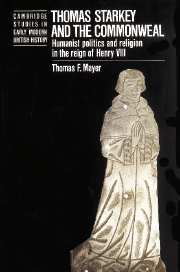Book contents
- Frontmatter
- Contents
- Acknowledgements
- A note on citations and abbreviations
- Introduction
- 1 Early life and education
- 2 Humanism from the source
- 3 ‘Occasyon and tyme wyl never be restorey agayne’: Pole, Paris and the Dialogue
- 4 A responsible aristocracy
- 5 The Dialogue in classical and ‘medieval’ tradition
- 6 An English spirituale
- 7 ‘Homo politicus et regalis’
- 8 Writing for the drawer
- Conclusion
- Bibliography
- Index
3 - ‘Occasyon and tyme wyl never be restorey agayne’: Pole, Paris and the Dialogue
Published online by Cambridge University Press: 03 November 2009
- Frontmatter
- Contents
- Acknowledgements
- A note on citations and abbreviations
- Introduction
- 1 Early life and education
- 2 Humanism from the source
- 3 ‘Occasyon and tyme wyl never be restorey agayne’: Pole, Paris and the Dialogue
- 4 A responsible aristocracy
- 5 The Dialogue in classical and ‘medieval’ tradition
- 6 An English spirituale
- 7 ‘Homo politicus et regalis’
- 8 Writing for the drawer
- Conclusion
- Bibliography
- Index
Summary
Probably sometime in 1528 Pole and Starkey returned to England. Starkey reacted enthusiastically, seeing ‘thys occasyon’ as his chance to begin a career in service to the commonwealth. Now that he and Pole had finished their education in Padua, the two of them would put their skills to practical use. Starkey's ambitions took on solid form in the elaborate reform programme offered in his Dialogue, which he composed in the main between 1529 and 1532. Pole's prospects encouraged Starkey to hope that he could gain office himself on Pole's coat-tails. They would have pulled strongly because of Pole's successful mission to the Parisian theologians in 1529–30, combined with the general lack of obvious direction from the centre in England. Starkey already had most of the pieces of his design for secular government in place when he began to write the Dialogue, but it seems likely that he gained some new ideas about ecclesiastical power while with Pole in Paris. The vibrant conciliarist tradition descending from Jean Gerson probably helped to foster Starkey's emphasis on cardinals and council. Debates in the theological faculty may have inspired some other aspects of the Dialogue as well. Pole's diplomatic assignment also brought Starkey into close contact with Englishmen interested in conciliarism and aware of the direction of policy at home.
Conflicting testimony and lack of much direct evidence continue to obscure Starkey's movements in the late 1520s, but now they affect our knowledge of Pole's actions, too.
- Type
- Chapter
- Information
- Thomas Starkey and the CommonwealthHumanist Politics and Religion in the Reign of Henry VIII, pp. 77 - 105Publisher: Cambridge University PressPrint publication year: 1989



